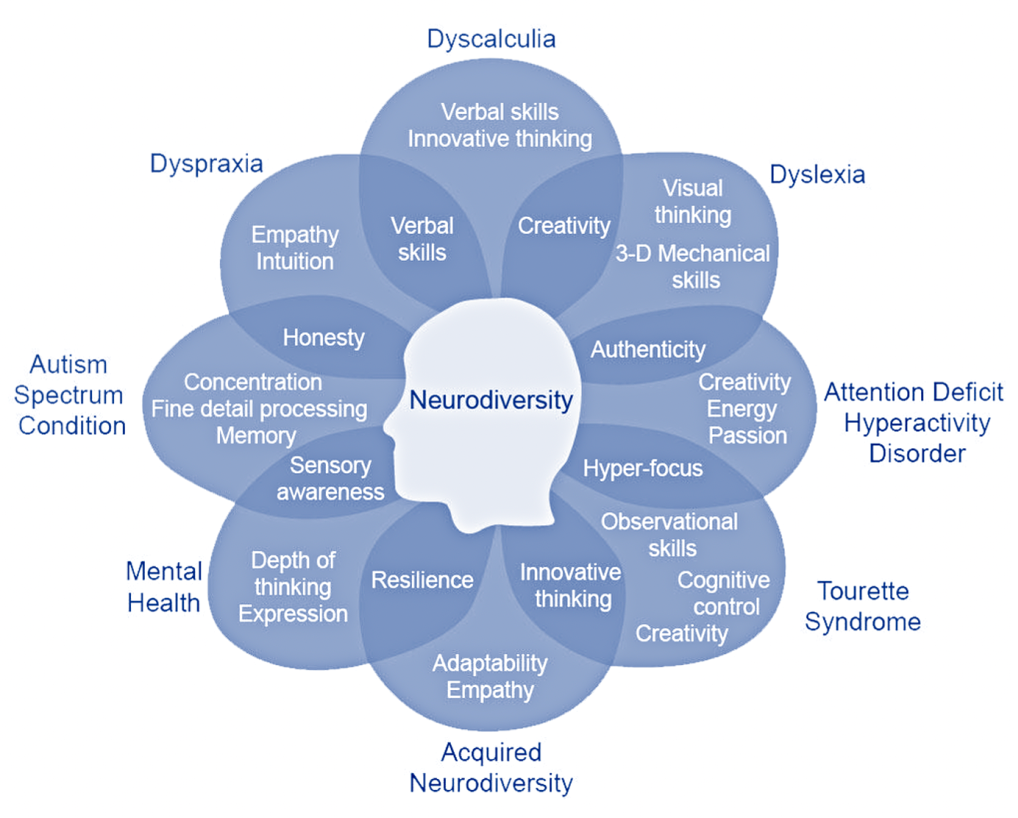
Neurodiversity refers to the natural variations in the human brain, including conditions such as autism, ADHD, dyslexia, and others. As our understanding deepens, society is beginning to see that neurodivergent individuals do not need to be ‘fixed’ or ‘cured,’ but rather understood, supported, and celebrated for who they are. There are many qualities that neurodiverse individuals possess that can inspire and teach us all.Whether you’re an educator taking autism training for teachers, a parent, a co-worker, or simply someone curious about the neurodiverse mind, this blog explores the standout qualities we can learn from—and why embracing them matters more than ever.
What Can Neurodiverse Minds Teach?
Here are a few qualities one can pick up from neurodiverse individuals that can inspire and educate every step of the way:
1. Authenticity and Honesty
Many neurodiverse individuals, especially those with moderate autism, are known for their straightforwardness and honesty. Unlike neurotypical individuals who might mask their feelings or say what’s socially expected, neurodiverse individuals often say exactly what they mean.
This quality fosters transparency and cuts through pretense, encouraging open communication in personal and professional spaces.
2. Deep Focus and Passion
A hallmark trait of many neurodiverse minds is the ability to focus intensely on subjects they care about. For example, individuals with hyperlexia and autism often exhibit an early fascination with letters, reading, or specific topics.
This intense interest can evolve into deep expertise, showing us the power of passion-driven learning. Their dedication reminds us to value deep work and to nurture curiosity, both of which are increasingly rare in our fast-paced world.
3. Unique Problem-Solving Skills
Thinking differently often leads to seeing solutions that others might miss. Neurodiverse individuals approach problems from unexpected angles, offering creative, out-of-the-box thinking.
In industries where innovation matters—like tech, design, and research—these fresh perspectives can lead to breakthroughs. Taking autism courses for professionals can help workplaces harness and support these talents effectively.
4. Strong Sense of Justice
Many people on the autism spectrum display a heightened sense of fairness and justice. They are often quick to notice inconsistencies, hypocrisy, or inequity, and are driven to call it out.
This moral clarity is something society can greatly benefit from, especially in an age where integrity and accountability are in high demand.
5. Attention to Detail
Individuals with moderate autism or related neurodivergent traits frequently notice patterns, anomalies, and details that others overlook. Whether it’s proofreading, coding, logistics, or data analysis, this strength adds tremendous value.
Their ability to spot the subtle can improve systems, quality control, and precision in many fields.

6. Resilience and Adaptability
Navigating a world not designed for you takes grit. Neurodiverse individuals, from childhood to adulthood, often face social misunderstandings, sensory overload, and educational challenges.
Despite this, many demonstrate incredible resilience. Their ability to adapt, cope, and thrive in environments that aren’t always accommodating is a lesson in perseverance.
7. Emotional Honesty
Though sometimes misinterpreted, many neurodiverse individuals are deeply empathetic and emotionally genuine. They may not always express feelings in conventional ways, but their emotional connections are sincere and meaningful.
Learning to appreciate different expressions of emotion enriches our understanding of human connection.
8. Innovation Through Neurodivergence
Neurodiversity has historically been at the heart of many innovations. Some of the world’s most creative minds have exhibited traits now associated with autism or ADHD.
By embracing neurodiversity, we open ourselves to radically new ways of thinking and solving problems.
9. Learning at One’s Own Pace
Traditional education systems often emphasize conformity and standardization, but neurodiverse individuals show us the importance of personalized learning. Students with hyperlexia autism, for example, may excel in reading at an early age but need more time for social skills development.
Understanding these varied learning trajectories through autism training for teachers enables educators to craft more inclusive classrooms where every learner’s strengths are valued.
10. Challenging Norms and Encouraging Inclusion
By their very nature, neurodiverse individuals challenge societal norms about communication, learning, and behavior. This challenge is not a deficit—it’s an opportunity to broaden our understanding of what it means to be human.
Inclusive practices benefit everyone, and neurodiversity pushes us to think more compassionately, creatively, and inclusively.
Bottom Line
Learning from neurodiverse individuals isn’t just about compassion—it’s about growth. Their honesty, focus, resilience, and unique ways of seeing the world offer powerful lessons for educators, employers, families, and society at large. By taking autism courses online, teachers can build the awareness and tools needed to better support neurodivergent minds—and in turn, enrich our own lives.
We believe education should be accessible for everyone. That’s why we don’t charge for our blogs. Find the right course that will help you in your career with us, contact us at 91-6292150868. You can mail us at act@asiancollegeofteachers.com
Get In Touch
UK – Registered OfficeAsian College Of Teachers Ltd (UK)
27, Old Gloucester Street, London – WC1N 3AX, UK
UK Toll Free: 0-808-189-1203
www.asiancollegeofteachers.co.uk
All SEN Courses are designed, developed and created by Asian College of Teachers Ltd, United Kingdom. These courses are certified by CPD Certification Service UK and endorsed by NCC Education, UK, and Short Courses from CACHE, UK through Laser Learning UK.
Asian College of Teachers (ACT) undertakes a continuous review of its teacher training courses to ensure imparting high quality education. However, there might be circumstances outside of ACT’s control which might affect its stakeholders like if you are planning to teach in a different country, applying for a teaching license, pursuing higher studies or trying to get the certificate approved by the Ministry of Education (MoE) of a particular country then you can do so with the certificate issued by Asian College of Teachers (ACT). However, each country’s Ministry of Education (MoE) or educational bodies set certain standards that are indispensable for the pursuit of higher studies or teaching in schools in that country. So it can be a possibility that you may be able to use the certificate for higher studies or teaching purposes in one country and not in another. Therefore, we strongly recommend that you investigate thoroughly and check with the relevant authorities regarding the acceptance of the certificate issued by us before you enrol on a particular course. ACT strives to offer high-quality education and its certificates can be valuable for various purposes internationally, but still it is crucial for individuals to verify the specific recognition of the certificate in the country they intend to use it, especially for formal education or professional licensing purposes. This approach ensures that the stakeholders make informed decisions regarding their educational and career paths.
© 2025 Asian College of Teachers. All Rights Reserved. Asian College Of Teachers is a trading brand of TTA Training Pvt. Ltd (India) - CIN U80902WB2016PTC215839, Asia Teachers Training Co., Ltd (Thailand) - Registration No. 0105558193360, Asian College Of Teachers Ltd (UK) - Company Number 9939942 & Asian College Of Teachers LLC, (USA) - Federal Tax Identification Number 30-1261596
Designed by kreativewebtech